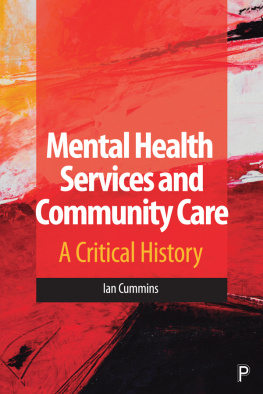CARE MANAGEMENT AND COMMUNITY CARE
For Elaine, Tom and Andrew
Care Management and Community Care
Social work discretion and the construction of policy
Mark Baldwin
University of Bath
First published 2000 by Ashgate Publishing
Reissued 2018 by Routledge
2 Park Square, Milton Park, Abingdon, Oxon OX14 4RN
711 Third Avenue, New York, NY 10017, USA
Routledge is an imprint of the Taylor & Francis Group, an informa business
Copyright Mark Baldwin 2000
All rights reserved. No part of this book may be reprinted or reproduced or utilised in any form or by any electronic, mechanical, or other means, now known or hereafter invented, including photocopying and recording, or in any information storage or retrieval system, without permission in writing from the publishers.
Notice:
Product or corporate names may be trademarks or registered trademarks, and are used only for identification and explanation without intent to infringe.
Publishers Note
The publisher has gone to great lengths to ensure the quality of this reprint but points out that some imperfections in the original copies may be apparent.
Disclaimer
The publisher has made every effort to trace copyright holders and welcomes correspondence from those they have been unable to contact.
A Library of Congress record exists under LC control number: 00132613
ISBN 13: 978-1-138-72475-4 (hbk)
ISBN 13: 978-1-315-19228-4 (ebk)
This book is a record of research exploring the limitations to successful policy implementation. Using Community Care as the illustrative example, it asks what these limitations might be, casting a particular light on the part played by care managers, the front-line policy implementers responsible for "needs assessments" which is a key activity in the implementation of Community Care. There is a tension in care management between the influence of procedures and the degree of discretion necessary for needs assessment to be completed effectively. In what ways, then, are policy intentions affected by the activities of care managers?
Community Care is an illustration of a public policy imposed by central government through a top-down process of implementation in what is argued as a rationalist endeavour to simplify the complexities of community care and reduce it to questions of technique and structure. This attempt to present a unified conceptualisation of community care is backed by managerial procedures referred to in the public management and policy literature as "managerialism". Social work practice theory provides a third example of the rationalist attempt to simplify processes involving complex social interactions.
The limitations to rationalist explanations of community care implementation and the necessity for a different kind of analysis are explored here. There is a parallel with the research methodologies employed for this research. The initial interviews were helpful in revealing the degree to which policy implementation was being thwarted by care managers, but this resistance was mirrored in their rejection of my interpretation of their practice.
The common thread running through the normative approach to policy implementation, management, social work practice and research methodology is an adherence to positivist forms of knowledge. The implementation of Community Care raises questions of epistemology and ontology that undermine these powerful ways of understanding. The claim is that a different epistemology would suggest practices more likely to lead to effective outcomes. An organisational orientation to effectiveness is revealed in the degree to which outcome has become wedded to techniques of scientific rationalism, A service user orientation would define outcome by the degree to which the needs of vulnerable adults were met through reflection upon key relationships. The first of these is an exercise in objectivity which is not well-equipped to take account of the subjective experiences of practitioners exploring needs in relationship with vulnerable adults. The service user orientation suggests an experiential and participative epistemology in which people engage in the process of learning and understanding most successfully when it is collaborative rather than imposed.
Analysis of fieldwork in the second stage involved an experiment using a participatory method of investigation. It gives the reader a glimpse of what might be possible in direct contrast to rationalist approaches. Work with two co-operative inquiry groups has led me to new understandings about the nature of learning for individuals and organisations. The book concludes that an effective learning environment facilitating positive and reflective use of discretion can be created through co-operative inquiry, although any approach would need to include other important participants, notably managers and service users, if it is to maximise its effectiveness in the long term.
Many things had to happen to ensure this book appeared in the way that it has. Consequently I would like to thank many people. On the intellectual side, my thanks go to Nick Gould and Peter Reason for their help in providing encouragement and the opportunity for critical reflection throughout the research journey. Linda Challis was there in an earlier phase and was helpful in getting me going. Thanks also to Judi Marshall and Bill Jordan for their constructive challenge to an earlier version.
On the organisational side my thanks go to Elaine Baldwin for all her work in getting the format and layout correct, and also to Clive and Mort for their two penn'orth!
For support and diversion my thanks go to colleagues Nick Gould, Nicki Liles, Jane Batchelor, Sue Barter-Dawe and Karen Boutland, house mates Elaine, Tom and Andrew and music makers Trish, Claire, Will, Andrew, Ben and Mark.
This book is a record of research that has been both theoretical and empirical. It sets out to contemplate the limitations to policy implementation in an environment in which there is room for interpretation of policy through the use of professional discretion by frontline staff within implementing organisations. This has enabled me to make a study of the use of discretion, a subject which has been written about in largely negative terms in the critical literature. The illustrative example is the implementation of Community Care policy during the 1990s, with the empirical work consisting of an analysis of literature, including Local and Central Government documents and direct contact with people involved in the implementation process, primarily at the lower end of Local Government Social Services Department hierarchies (care managers and first line managers). I set out with an interest in knowing how it was that care managers (a key group of professionals in the implementation of Community Care policy) knew what they should do given the bewildering array of knowledge available to them to draw upon in their practice. There is, in what follows, a brief history of the development of Community Care as well as an analysis of the key texts that define the policy intentions of Central and Local Government for the prime tasks of assessment and care management. Empirical work has taken me to meet with care managers and their managers to ask them what informs their practice in carrying out these sophisticated roles, and an interpretation of these meetings is included in detail. Having discovered from this empirical work that not only do care managers find such explanation hard, but also that their practice was in many ways different from the intentions of policy makers, I was then interested in exploring why this should be. This led me on a further journey of exploration providing more information on which I could reflect and increase my understanding.






